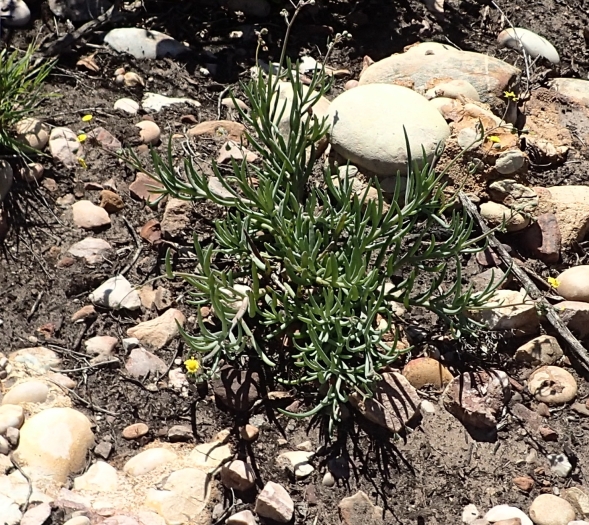Little Pickles In The Usa
(Crassothonna capensis)
Little Pickles In The Usa (Crassothonna capensis)
/
/

Nicola van Berkel
CC BY-SA 4.0
Image By:
Nicola van Berkel
Recorded By:
Copyright:
CC BY-SA 4.0
Copyright Notice:
Photo by: Nicola van Berkel | License Type: CC BY-SA 4.0 | License URL: http://creativecommons.org/licenses/by-sa/4.0/ | Rights Holder: Nicola van Berkel | Publisher: iNaturalist | Date Created: 2021-04-30T13:15:46-07:00 |










Estimated Native Range
Summary
Crassothonna capensis, commonly known as Little Pickles in the USA, Ruby Necklace in Australia, and Bobbejaankool in Afrikaans, is a low-growing, succulent perennial herb native to South Africa, particularly thriving in rocky outcrops and sandy soils of the Western Cape. It typically forms a spreading ground cover with finger-like, blue-grey leaves that are spirally arranged and become tipped with maroon under dry conditions. The plant reaches a height of 2-4 inches (5-10 cm) and spreads outwards to 24 inches (61 cm). Crassothonna capensis produces bright yellow, daisy-like flowers on long, slender stems, which bloom mainly in the fall and are moderately showy, adding a splash of color to the landscape.
This species is valued for its drought tolerance and unique foliage color, making it an excellent choice for rockeries, terrariums, indoor hanging pots, and outdoor xeriscaping. It is particularly useful in areas with water restrictions or for gardeners seeking low-maintenance plants. In cultivation, it requires full sun to maintain its vibrant leaf coloration and prefers well-draining soil. While it tolerates low water conditions, moderate watering will keep it looking its best. It is not known for having significant disease or pest problems, but overwatering can lead to root rot. Crassothonna capensis is also appreciated for its rapid growth rate, allowing it to fill in spaces quickly as a ground cover.CC BY-SA 4.0
This species is valued for its drought tolerance and unique foliage color, making it an excellent choice for rockeries, terrariums, indoor hanging pots, and outdoor xeriscaping. It is particularly useful in areas with water restrictions or for gardeners seeking low-maintenance plants. In cultivation, it requires full sun to maintain its vibrant leaf coloration and prefers well-draining soil. While it tolerates low water conditions, moderate watering will keep it looking its best. It is not known for having significant disease or pest problems, but overwatering can lead to root rot. Crassothonna capensis is also appreciated for its rapid growth rate, allowing it to fill in spaces quickly as a ground cover.CC BY-SA 4.0
Plant Description
- Plant Type: Herb
- Height: 0.3-0.5 feet
- Width: 1-1.3 feet
- Growth Rate: Moderate
- Flower Color: Yellow
- Flowering Season: Spring, Fall
- Leaf Retention: Evergreen
Growth Requirements
- Sun: Full Sun
- Water: Low, Medium
- Drainage: Medium
Common Uses
Border Plant, Butterfly Garden, Drought Tolerant, Erosion Control, Groundcover, Low Maintenance, Potted Plant, Street Planting
Natural Habitat
Native to rocky outcrops and sandy soils of the Western Cape in South Africa
Other Names
Common Names: Ruby Necklace, Cape Aster, Cape Othonna, Bobbejaankool
Scientific Names: , Othonna capensis, Crassothonna capensis, Othonna filicaulis,
GBIF Accepted Name: Crassothonna capensis (L.H.Bailey) B.Nord.